| Article ID | Journal | Published Year | Pages | File Type |
|---|---|---|---|---|
| 6235625 | Journal of Affective Disorders | 2011 | 7 Pages |
Emotion biases feature prominently in cognitive theories of depression and are a focus of psychological interventions. However, there is presently no stable neurocognitive marker of altered emotion-cognition interactions in depression. One reason may be the heterogeneity of major depressive disorder. Our aim in the present study was to find an emotional bias that differentiates patients with melancholic depression from controls, and patients with melancholic from those with non-melancholic depression. We used a working memory paradigm for emotional faces, where two faces with angry, happy, neutral, sad or fearful expression had to be retained over one second. Twenty patients with melancholic depression, 20 age-, education- and gender-matched control participants and 20 patients with non-melancholic depression participated in the study. We analysed performance on the working memory task using signal detection measures. We found an interaction between group and emotion on working memory performance that was driven by the higher performance for sad faces compared to other categories in the melancholic group. We computed a measure of “sad benefit”, which distinguished melancholic and non-melancholic patients with good sensitivity and specificity. However, replication studies and formal discriminant analysis will be needed in order to assess whether emotion bias in working memory may become a useful diagnostic tool to distinguish these two syndromes.
